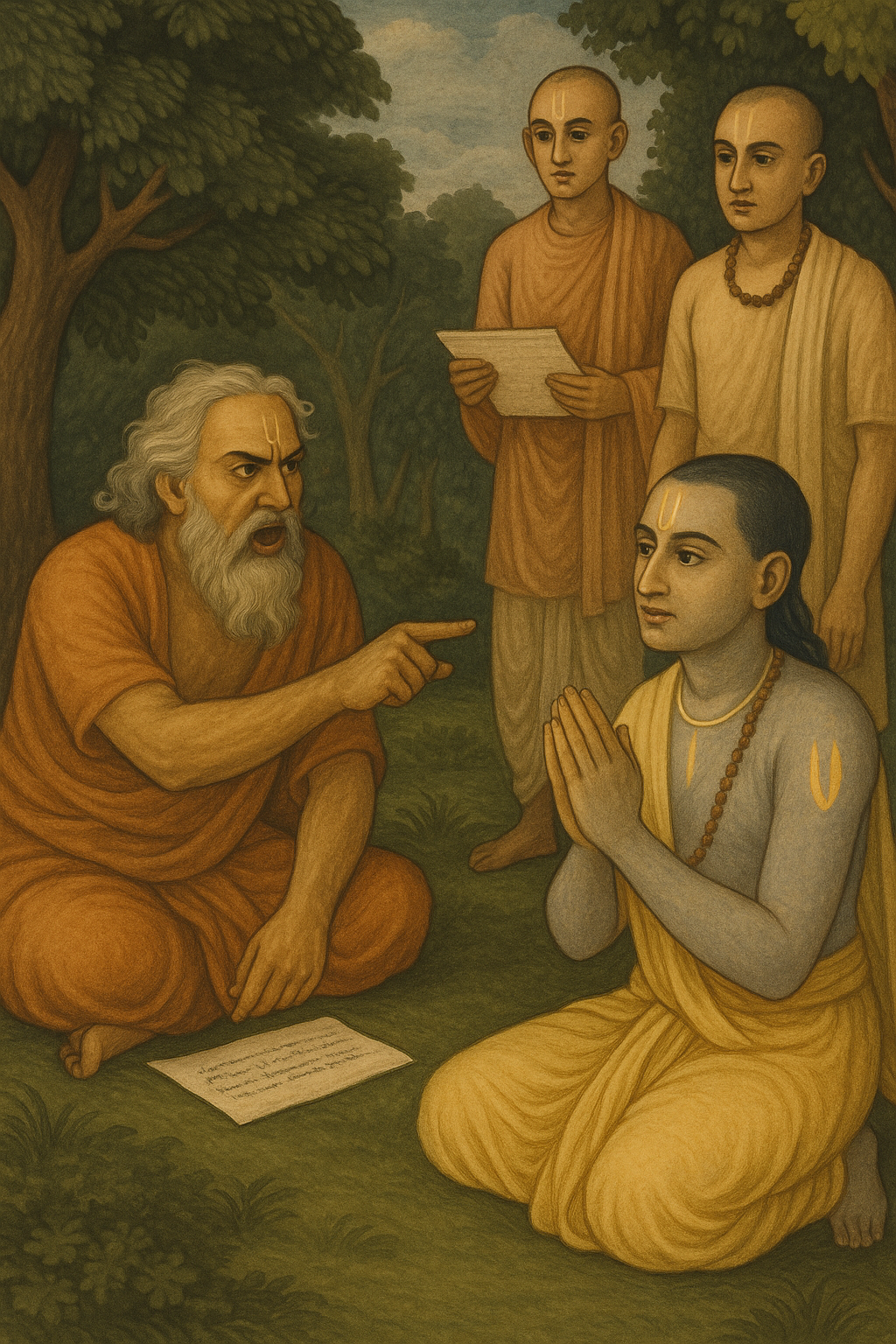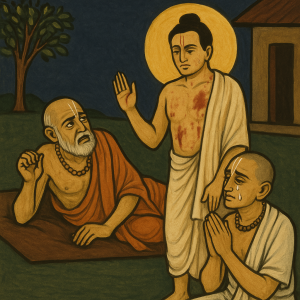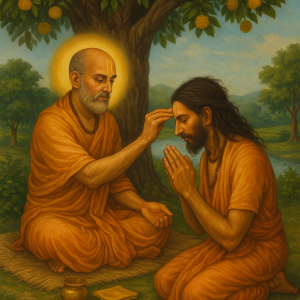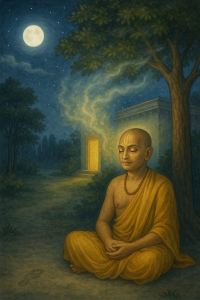(From Śyāmānanda Prakāśa – Chapter 2)
The Storm of Rumors
While Śyāmānanda was absorbed in his divine service in Vṛndāvana under the affectionate care of Śrī Jīva Gosvāmī, the villagers and pilgrims began to speak in whispers:
“Duhkhi Kṛṣṇadāsa is now called Śyāmānanda. Look at the brilliant golden tilaka on his forehead—he has changed his guru. He now belongs to Śrī Jīva!”
Like wildfire, these rumors reached the ears of many Vaiṣṇavas in both Vraja and Gauḍadeśa. And eventually, the echo of those whispers stormed into the peaceful āśrama of Śrī Hrdayānanda Gosvāmī.
Upon hearing that his own disciple had received a new name and a new tilaka—and that too, under the apparent guidance of another guru—Hrdayānanda became like a blazing fire.
“What is this?” he cried. “Kṛṣṇadāsa has abandoned me and taken initiation from Śrī Jīva? Is there a scriptural basis for this? Even Mahāprabhu and Nityānanda Prabhu never acted this way!”
A Guru’s Fury Ignited
His heart pierced by what he believed was betrayal, Hrdayānanda roared:
“If what I’ve heard is true, then Jīva Gosvāmī has violated all śāstric decorum. Let me send my disciples to find out the truth—and bring Kṛṣṇadāsa back!”
He summoned a group of his followers and gave them precise instructions:
- Go to Vṛndāvana.
- Confront Śyāmānanda.
- Ask whether he has indeed rejected his guru.
- If so, bring him back.
- If Jīva refuses, then at least bring back his letter and explanation.
And with great agitation, he wrote a stern letter to Śrī Jīva Gosvāmī and gave it to the party of devotees.
The Mission to Vṛndāvana
After a long journey through the forests and riverbanks of North India, the party reached Vṛndāvana. They approached Śrī Jīva Gosvāmī with folded hands and the serious faces of men carrying the burden of spiritual conflict.
Jīva, the embodiment of humility, welcomed them graciously, offered them water and prasādam, and then received the letter from Hrdayānanda.
Opening it, he read in silence. The tone was accusatory. The content was painful. Yet Śrī Jīva’s heart remained soft and composed.
Śrī Jīva’s Gentle Defense
He spoke gently:
“O honored Vaiṣṇavas, please understand: I have never accepted Kṛṣṇadāsa as my disciple. I am unworthy even to become a student of your revered guru. I hold Hrdayānanda Gosvāmī in the highest regard.
It was at his own command that Kṛṣṇadāsa came here. I only allowed him to remain to hear kṛṣṇa-kathā and serve the kunja. By his purity, he has become absorbed in prema. If his tilaka or name has changed, it is not by my doing. Ask him yourself.”
Then he revealed something unexpected:
“One day, Kṛṣṇadāsa told me he had seen a dream—his own guru appeared before him, blessed him, changed his name to Śyāmānanda, and placed a new tilaka on his forehead. From that moment, I understood that Śrī Hrdayānanda Gosvāmī himself, by divine will, has initiated this transformation.”
Śyāmānanda’s Loyalty and Humility
Śyāmānanda was called before them. Bowing low at their feet, he declared with folded hands:
“I am forever the servant of Śrī Hrdayānanda Gosvāmī. Whatever has happened in my life has been by his grace. I have only followed his order—to stay in Vṛndāvana, hear from saintly devotees, and serve the kunja of Rādhā-Kṛṣṇa.
That dream—wherein he gave me this name and tilaka—was more real than my waking life. Even now, my heart cries for his mercy. I have never rejected him. He is my guru, my guide, and the very breath of my life.”
The party of devotees was moved. Their hard expressions softened, and they could feel the sincerity flowing from Śyāmānanda like a river of nectar.
Śrī Jīva’s Loving Wisdom
To put their hearts at ease, Śrī Jīva requested:
“Please carry this explanation back to your Guru Mahārāja. Tell him that the tilaka and the name are but reflections of his own divine grace flowing through his beloved disciple.”
And then he added a final gesture of spiritual diplomacy:
“Let us not disturb the bond between guru and disciple. Let us glorify it. Say only that ‘Śyāmānanda’ is the name given by Hrdayānanda himself.”
Reflections and Lessons
- Guru’s love is possessive, but must mature into understanding: Hrdayānanda’s initial anger reflects how even pure souls can be confused by external appearances. But his journey toward understanding shows the humility required for deep relationships.
- The spiritual path requires both boldness and obedience: Śyāmānanda did not abandon his guru—he boldly carried out his guru’s mission even when misjudged. He is the perfect example of truth in loyalty and loyalty in truth.
- Dreams in bhakti are not fantasies—they can be revelations: When a devotee lives in deep remembrance, even their dreams are doorways to the eternal world. Śyāmānanda’s dream was no less valid than a divine appearance.
- The role of the advanced Vaiṣṇava is to harmonize, not polarize: Śrī Jīva Gosvāmī shows how a spiritual leader should respond—with calm wisdom, not defensive pride. He transformed conflict into union and misunderstanding into glorification.
- A true disciple never abandons their guru—even when misunderstood: Śyāmānanda bore the weight of accusation without resentment. His humility and fidelity are a shining standard for all aspiring sādhakas.



